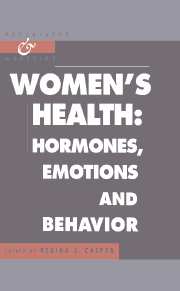Book contents
- Frontmatter
- Contents
- Preface
- 1 Growing up female
- 2 Reproduction and its psychopathology
- 3 Women's sexual function and dysfunction
- 4 Gender differences in brain morphology and in psychiatric disorders
- 5 Thyroid hormones in major depressive disorder and bipolar disorder
- 6 The hypothalamic-pituitary-adrenocortical system
- 7 The cost of starvation: Eating disorders
- 8 Coronary artery disease and women: Estrogens and psychosocial and lifestyle risk factors
- 9 The psychophysiology of breast cancer: Disease, hormones, immunity, and stress
- 10 The psychopharmacology of women
- 11 Intervention trials concerned with disease prevention in women
- References
- Index
11 - Intervention trials concerned with disease prevention in women
Published online by Cambridge University Press: 08 February 2010
- Frontmatter
- Contents
- Preface
- 1 Growing up female
- 2 Reproduction and its psychopathology
- 3 Women's sexual function and dysfunction
- 4 Gender differences in brain morphology and in psychiatric disorders
- 5 Thyroid hormones in major depressive disorder and bipolar disorder
- 6 The hypothalamic-pituitary-adrenocortical system
- 7 The cost of starvation: Eating disorders
- 8 Coronary artery disease and women: Estrogens and psychosocial and lifestyle risk factors
- 9 The psychophysiology of breast cancer: Disease, hormones, immunity, and stress
- 10 The psychopharmacology of women
- 11 Intervention trials concerned with disease prevention in women
- References
- Index
Summary
Until recently most large randomized trials to test the effectiveness of methods of reducing risk for disease occurrence and mortality were conducted among men. Examples are trials of cholesterol-lowering drugs, antihypertensive medications, and aspirin and beta carotene. It has become apparent that trials in women are also needed, for several reasons: The results of studies in men cannot necessarily be generalized to women, to some extent different prophylactic agents are available to men and women, and the relative importance of some diseases differs between men and women. Several prophylactic trials in women have been started in recent years. However, some of the trials are quite controversial.
This chapter describes and critically reviews some major prophylactic trials that have been recently initiated among women in the United States, including the Postmenopausal Estrogen/Progestin Interventions (PEPI) Trial of the effects of several hormone replacement therapy regimens on predictors of coronary heart disease, the Women's Health Initiative of long-term effects of a low-fat dietary pattern, hormone replacement therapy, and calcium/vitamin D supplements on the incidence of several diseases, the Heart Estrogen/progestin Replacement Study (HERS) of hormone replacement therapy to prevent recurrence of coronary heart disease, the Breast Cancer Prevention Trial of the chemotherapeutic agent tamoxifen to reduce the risk of breast cancer, the Women's Health Study of aspirin, beta carotene, and vitamin E as protective agents against coronary heart disease and cancer, and a small pilot study to explore whether use of luteinizing hormonereleasing hormone agonists combined with other hormones can reduce the incidence of female cancers. We also briefly describe some smaller trials of agents to prevent osteoporosis, as trials in this area have been undertaken among women for several decades.
Keywords
- Type
- Chapter
- Information
- Women's HealthHormones, Emotions and Behavior, pp. 219 - 242Publisher: Cambridge University PressPrint publication year: 1997

